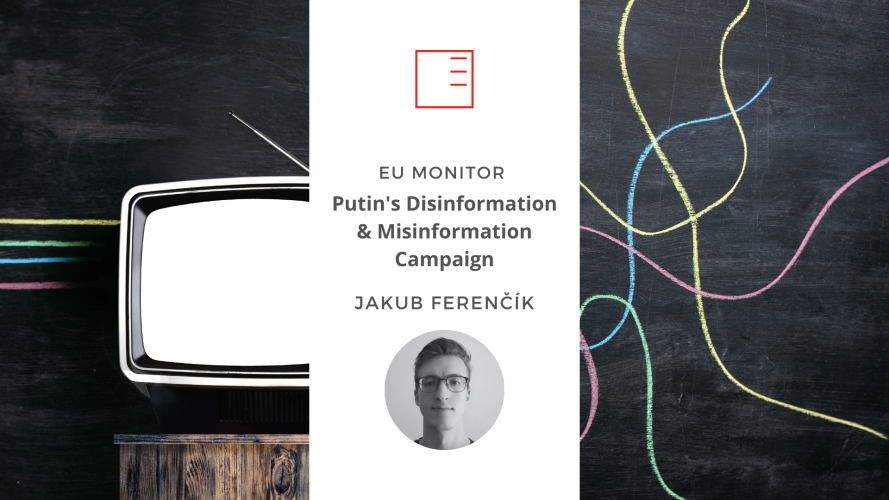EU MONITOR: Putin's Disinformation & Misinformation Campaign
Disinformation and misinformation have been amplified in the digital age. In order to combat their increasing presence in our everyday lives, we have to first educate ourselves on what disinformation is. In this post, Jakub Ferencik looks at this question in some detail, primarily by analyzing Vladimir Putin’s usage of disinformation in politics.
False and misleading claims have always been a part of politics. They function as a useful political tool in a world where media attention can only entertain a limited amount of topics in any given moment. In modern history, the sheer volume and speed of the information stream has enabled public actors, most notably many politicians, to capitalize on the corresponding shortening of attention span that the deluge of (dis)information has facilitated. While some politicians have therefore resorted to purposefully erroneous arguments in order to bolster support for their campaigns, others are an unfortunate product of their time and reality; in a society in which empirical evidence, complex studies and nuances are giving way to the latest headlines, politicians follow suit.
The war in Ukraine is by no means the first in which the information warfare features prominently, but it is arguably the first in which the tools of the digital age are fully brought to bear amongst major geopolitical players, and with corresponding major geopolitical implications. Hence, this paper will examine Vladimir Putin’s modus operandi with regards to disinformation and the implications of his attempts to sow discord in Ukraine and the West.
You can read the entire document through the PDF button.
#EU MONITOR #DisinformationResearch Assistant
Publications series
Raising awareness about the inner workings of the European Union and how they impact the influence of the Czech Republic within EU structures.
Related articles
- REPORT | Shaping Our Digital Future: tackling Disinformation in the EU, case of Central and Eastern Europe
- EU MONITOR | THREE RESPONSES TO DISINFORMATION IN THE EUROPEAN UNION
- EU MONITOR | From boom to bust: How uncoordinated policies halted solar power deployment in Czechia
- EU MONITOR: Recharging the Czech EU Presidency
- EU MONITOR: Geothermal energy and the Visegrad group
- EU MONITOR: Is EU leading the way to becoming a global change in business and human rights?
- EU MONITOR: Czechs and the Post-2020 Multiannual Financial Framework
- EU MONITOR: Czech Perception of the EU Defence Policy
- EU MONITOR: Brexit, now what? Examining the future of Central and Eastern European security post-Brexit
- EU MONITOR: An Arduous Path: Are Bulgaria, Croatia and Romania Ready to Join the Area?
- EU MONITOR: The challenges of the military integration in the EU: an approach to the heterogeneity of weapon system categories
- EU MONITOR: Eurozone Reform: A Victim of Political Economy
- EU Monitor: The Amazon Wildfires and Environmental Conservation: What Can the EU do?
- What EU Policy to Expect from the incumbent Czech Government?
- The Future of Europe under construction
Staroměstské náměstí 4/1
Prague 1 - Staré Město
110 00
tel.: +420 212 246 552
email: europeum@europeum.org
https://www.europeum.org



